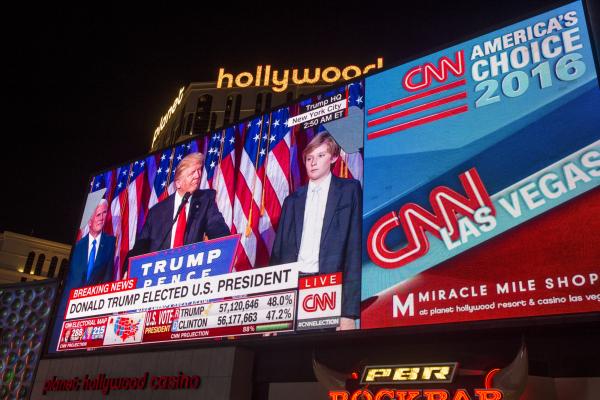Every year for Lent, my father chose a religious discipline, giving up alcohol, meat, and even driving in a car for the 40 days before Easter. After George W. Bush decided to invade Iraq on March 20, 2003, my father realized that his anger toward Bush was affecting his own peace of mind.
“That’s it,” he said, “I’ve become much too negative: I’m giving up talking about George W. for Lent.” At this point, my mother just nodded, agreeing to go along for the Lenten ride.
For my father, discipline created freedom, so he held his promise, refusing to engage in negative talk about Bush but engaging in his local community as an alternative act of resistance.
In the initial weeks of the Donald Trump administration, I’ve found myself addicted to the headlines, my Facebook feed, and publications like the Washington Post, New York Times, and even Teen Vogue. Each morning, I wake in nervous anticipation of another upsetting event: the Muslim ban, the proposed gutting of the Environmental Protection Agency, Steve Bannon’s role on the National Security Council.
As a teacher of environmental education, I need to stay informed. But as a mother and writer, I need to stay grounded so I can advocate for justice for my children over the long haul. If my father could give up talking about George W. Bush for 40 days, could I take a Trump Sabbath and fast from the headlines for 24 hours?
On the morning of my self-declared Trump Sabbath, I willed myself to walk past my laptop without lifting the screen while I drank my coffee before church. I felt pulled toward the hidden light of the screen, a magnetic craving in my body. To be clear, I yearned for updates — not only about the bad news coming from this administration — but also the good news of my students, like Kelsey Juliana, the lead plaintiff in a lawsuit suing the federal government for failure to protect youth from the impacts of climate change.
But I also knew that my obsession with the headlines was fracturing my attention, like a toddler chasing a rubber ball bouncing off the walls.
On the eve of the inauguration, I spoke at a creation care event, a gathering to pledge 100 acts for the earth in the first 100 days of the Trump administration. Before the crowd, I confessed my addiction to the news, noting that I was absorbed in annotations of events, when I wanted to move toward animation of my life. The next week, NPR posted a story: “ President Trump’s Tweets Annotated.” Reading the headline made my stomach churn, so I knew that a Trump Sabbath would be one small strategy to reclaim my mind and refocus my actions toward protecting people and places.
As my daughter and I sat in church that morning, I opened the bulletin to read the Gospel for the day, Matthew 5:13-20, when Jesus says: “You are the light of the world. A city built on a hill cannot be hid ...”
The children’s choir sang an arrangement of “This Little Light of Mine,” and I watched the faces of the parents, as they watched their children, some of the adults mouthing the words in concert with the young singers. This is a Sabbath connection, I thought, away from the light of the screen, tapping into the animated light of others.
During the sermon, the Rev. Shannon Spencer, with her shoulder-length brown hair and earnest gaze, addressed us from the pulpit in her rich Southern drawl. She reminded us that past leaders have used the “city on a hill” metaphor, including John Winthrop, John F. Kennedy, Ronald Reagan, and Barack Obama.
Matthew’s Gospel was written in a time of great division, the Rev. Spencer said, and now is the time for counter-cultural actions, as Jesus himself was a radical extremist, in the best sense of the phrase. We are called, she said, to love defiantly in the face of violent intolerance, as there is a “God-spark” in each of us.
Rev. Spencer knows a thing or two about defiant love, as she works on the frontlines to confront homelessness in our region, collaborating on an initiative called “Twelve Baskets” that provides sit-down meals with foods donated by local restaurants to anyone who walks in the door.
“Communion with others is an act of protest,” she said, “which bears witness to God’s promise of abundance. So much is vying for our loyalty these days. So whom do we follow?”
At the end of the sermon, I glanced at a friend whose eyes glistened with tears, mirroring my emotions. My friend had posted on Facebook last week that Trump turned her into an activist.
As I walked out of church, I saw another mother who runs a large organic farm in our region. “My kids asked me this morning why we had to go to church,” she said. “I told them we had to go to remember that there are good people doing good work in the world.”
Thus my Sabbath began with connection and a call to action is this dystopian time. For the rest of the day, I put away my laptop and stayed outside with my younger daughter, marveling at the newborn calves in the pasture near our house, cooking dinner for my family, reading snippets of a memoir. Tomorrow would be the time to call my elected officials – yet again – and to join with others in protest. But today was a pause for healing.
It’s not prudent for me to fast from the news for 40 days, but I made it through my Trump Sabbath, one day of animating my body with the radical act of communion in the light of others.
Got something to say about what you're reading? We value your feedback!

